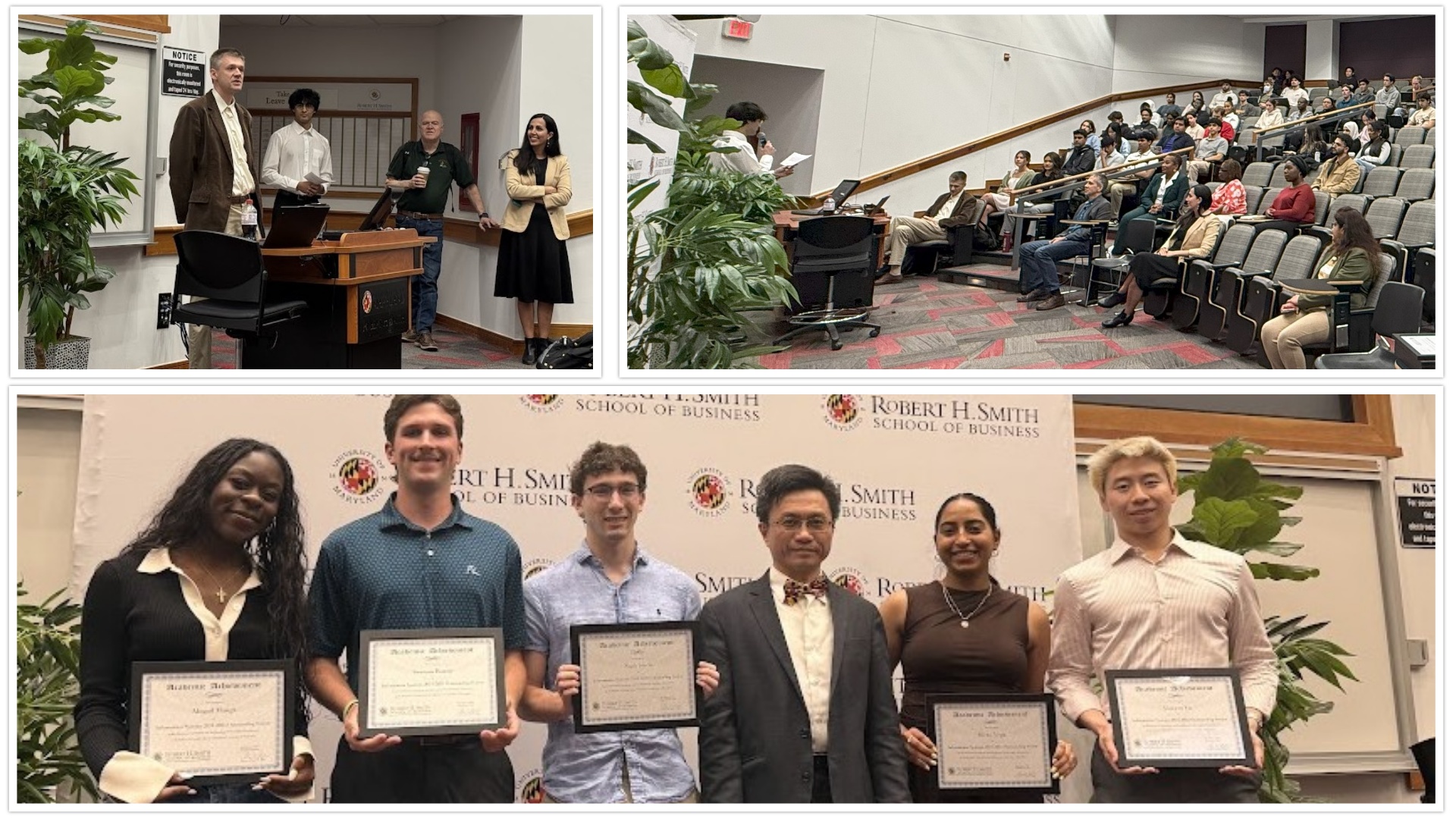
Thought leaders and innovators from the fields of AI, data and cybersecurity recently came together in Van Munching Hall to give students insights into the likes of deepfakes. This, in the context of it convincingly replicating voices and images with minimal data, creating serious threats such as financial fraud, reputational damage and legal complications. The forum – the annual TechFest on April 17, 2025 – was hosted by the University of Maryland Robert H. Smith School of Business Department of Decision, Operations & Information Technologies (DOIT) and the Business & IT Society (BITS).
“The students learned about the ethical challenges, biases and privacy concerns tied to AI and cybersecurity, recognizing that technology alone isn’t enough to protect against these risks,” said Associate Clinical Professor Minoo Modaresnezhad, who organized TechFest with faculty colleague Bharti Motwani. “Equally important was the discussion on mental health and human-centered leadership in cybersecurity, especially in high-pressure environments, where decision making impacts entire organizations,”
For business and management, “these lessons highlight the critical need for proactive risk management, ethical oversight, employee well-being initiatives, and a leadership approach that balances innovation with responsibility – ensuring that both systems and people are resilient, adaptable, and prepared for the challenges of an AI-driven world,” Motwani added.
DOIT Chair Ilya Ryzhov gave the opening remarks and BITS President Moiz Chaudhry welcomed the audience and the TechFest 2025 featured speakers.
Speaker Highlights
IBM Distinguished Engineer Jeff Crume focused on the growing threat of deepfakes and synthetic reality in cybersecurity, highlighting how AI-generated, highly realistic voice and video can convincingly impersonate people with as little as three seconds of audio. He demonstrated this through a Deepfakes video involving Morgan Freeman and discussed how deepfakes pose serious financial, political, legal, and reputational risks by enabling scams, impersonation, misinformation, and corporate fraud. He emphasized that while detection technologies exist, they are currently unreliable and lag behind the rapidly advancing AI, making it critical for individuals and organizations to remain vigilant and skeptical of what they see and hear online. He also acknowledged that while deepfakes can have constructive uses, the risks they pose to privacy, security, and trust in digital content are increasingly severe and difficult to control.
Global Cybersecurity Executive and former Chief Information Security Officer for FEMA Cynthia Sutherland’s “Resilience in the Age of Artificial Intelligence and Cyber Threats,” focused on the evolving challenges posed by AI-integrated technologies, emphasizing how cars, planes, and digital systems now function as interconnected, intelligent ecosystems. She stressed the importance of secure-by-design and secure-by-default principles, advocating for security to be built into systems from the outset rather than added later. She discussed the growing vulnerabilities within both civilian and military infrastructures, referencing breaches like those at the Department of Defense, and highlighted the role of generative AI in both improving and complicating cybersecurity. She emphasized the need for adaptive, well-documented, and automated security practices to ease employee stress and prevent burnout. In addition to technical solutions, she underscored the importance of mental resilience and human-centered leadership, sharing personal stories to remind professionals in this high-pressure field to stay grounded, protect their well-being, and foster a culture of innovation with integrity.
Ray Islam, Senior Lead AI Scientist, Booz Allen Hamilton and adjunct professor at George Mason University, focused on the ethical challenges and dual-use nature of generative AI and machine learning in cybersecurity. He explained that while generative AI, which creates new content like text, images, audio and code, offers productivity and defensive benefits, it also introduces significant risks such as privacy intrusions, misinformation and AI-generated attacks like malware and deepfakes. He emphasized that the current state of cybersecurity remains largely diagnostic, with a need for better predictive tools, and stressed the ongoing requirement for skilled human oversight despite AI’s growth. He highlighted the dangers of biased AI models, uneven access, and improper data practices, while sharing personal experiences from high-pressure cybersecurity work environments like the Pentagon. Concluding on a hopeful note, he encouraged developing AI literacy across industries to responsibly harness its potential for a safer future.
Student Recognitions
TechFest concluded with Associate Clinical Professor Adam Lee, the Undergraduate IS Curriculum Committee Chair, presenting the 2024-2025 “Outstanding Seniors” awards to four recent graduates and six graduating students: Emma Karch, Abigail Manga, Angie McGonigle, Seamus Rane, Esther Soon, Noah Stern, Christina Tang, Kiran Vera, Vincent Yu and Rebecca Zhang. Those students are hand-picked by information systems faculty members based on overall GPA, grades in IS courses, assistantship, leadership, fellowship, service to the department and overall contributions.
Read more about the Decision, Operations and Information Technologies Department.
Media Contact
Greg Muraski
Media Relations Manager
301-405-5283
301-892-0973 Mobile
gmuraski@umd.edu
About the University of Maryland's Robert H. Smith School of Business
The Robert H. Smith School of Business is an internationally recognized leader in management education and research. One of 12 colleges and schools at the University of Maryland, College Park, the Smith School offers undergraduate, full-time and flex MBA, executive MBA, online MBA, business master’s, PhD and executive education programs, as well as outreach services to the corporate community. The school offers its degree, custom and certification programs in learning locations in North America and Asia.